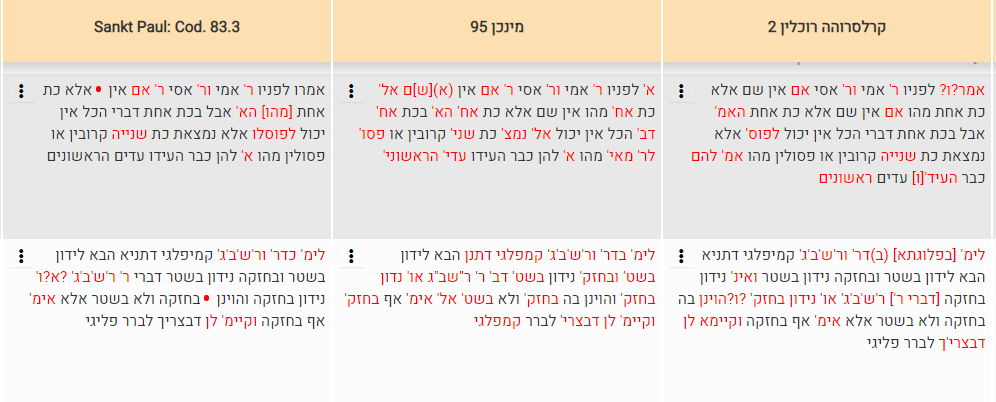The "Rav Ashi" Alternative
In Sanhedrin 23a, after Rabbi Yochanan saying something, we have Rav Ami and Rav Ashi speaking to Rabbi Yochanan!
אָמְרוּ לְפָנָיו רַב אַמֵּי וְרַב אַסִּי: אֵין שָׁם אֶלָּא כַּת אַחַת, מַהוּ?
Rav Dimi continued: Rav Ami and Rav Asi said before Rabbi Yoḥanan: If there is only one set of witnesses there, what is the halakha?
So in Sefaria / Rav Steinsaltz and in Artscroll. Surely they are Rabbi Ami and Rabbi Asi? The answer is yes, they are, but the Vilna Shas has it as Rav Ami and Rav Asi, and no one bothered to correct.
Especially, no one bothered to correct because there isn’t something definitive to point to in earlier printings or manuscripts. This is because all of those just have R’ Ami and R’ Asi.
At any rate, the gemara then has a possible interjection or a possible reaction, after this question.
אֵין שָׁם אֶלָּא כַּת אַחַת? וְהָאָמְרַתְּ: אֲבָל בְּכַת אַחַת דִּבְרֵי הַכֹּל אֵין יָכוֹל לְפוֹסְלָן! אֶלָּא, נִמְצֵאת כַּת שְׁנִיָּה קְרוֹבִין אוֹ פְסוּלִין – מַהוּ?
The Gemara interrupts: If there is only one set of witnesses there, what is the dilemma? But didn’t you already say: But in a case of one set of witnesses, everyone agrees that a litigant cannot disqualify them? Rather, the question should be understood as follows: According to Rabbi Meir, who holds that a litigant can disqualify one of the other litigant’s two sets of witnesses, if the second set is ultimately found to be related to one of the litigants or to each other, or is disqualified from bearing witness for other reasons, what is the halakha? Can the litigant whose witnesses were disqualified then claim that the other litigant was not capable of disqualifying the first set, as it turned out that they were the only witnesses who would be testifying against him?
So a rethinking of the question, or a reframing of the question.
What you would then expect to occur is for Rabbi Yochanan to respond to them. Otherwise, it seems like it would be an ibaya delo ifsheta, an unresolved question, at least until later.
Then, we have two versions of what happens next, encoded in our Talmudic text itself:
אָמַר לָהֶן: כְּבָר הֵעִידוּ עֵדִים הָרִאשׁוֹנִים. אִיכָּא דְּאָמְרִי, אָמַר רַב אָשֵׁי: כְּבָר הֵעִידוּ עֵדִים הָרִאשׁוֹנִים.
Rabbi Yoḥanan said to them: The first pair of witnesses, i.e., the second litigant, who disqualified the other litigant’s first set of witnesses, already testified. Since his testimony was valid at the time it cannot be disqualified afterward. Some say this statement in the name of a different amora: Rav Ashi says: The first pair of witnesses already testified.
So, according to the first version, in fact Rabbi Yochanan replied to them. In the second variant — going a bit against what the English translation under Rav Steinsaltz’s direction has it — not just any random Amora, but Rav Ashi, the Talmudic Redactor, says it. Perhaps in response to the revised version of the question. The Talmudic Narrator isn’t always the same as Ravina / Rav Ashi, and may often be earlier or later, but attributing it to Rav Ashi seems like saying that this was only resolved much later, as if it were Stamma.
Even more interesting is that here we have an אִיכָּא דְּאָמְרִי that is in fact an ikka de’amrei, that some texts (or perhaps even earlier oral traditions) have one or the other. Let’s see.
The printings - Vilna, Venice, Barco, are late, and are unremarkable in that they have both with an אִיכָּא דְּאָמְרִי.
This amar lehem or alternatively amar Rav Ashi is matched by the Yad HaRav Herzog manuscript:
However, the other manuscripts, namely Florence 8-9, Reuchlin 2, Sanct Paul, and Munich 95 all just have Rabbi Yochanan’s response and no Rav Ashi alternative. Thus (skipping one because Yad HaRav Herzog intervenes):
There’s one other interesting fragment, BL: Or. 5558 N/67–68, which the page begins right after it explicitly said that he (Rabbi Yochanan) replied to them), but does what was said followed by an ika de’amrei:
The alternative response is attributed to רבא. But then, above the line, a samech yud is written, thus transforming it to Rav (not Rabbi) Asi
, the same person as above. This would mean that one of the participants in the question gave the answer!
Anyway, that seems unlikely. I think that there must have been some manuscripts we haven’t encountered that only had no one, or only had Rav Ashi, present, and then these were copied in to texts but designated with an ika de’amrei.







